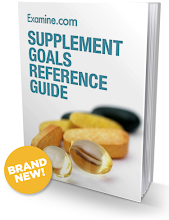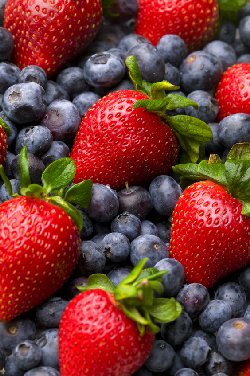The Good
We've all heard it a million times before, from a million different sources: Eat your anti-oxidants. But really, what the heck ARE "anti-oxidants"? To understand what they are, what they do, and what this means to the average athlete, we need to delve into a wee bit o' biochem. Save the groans, pour yourself a cup o' java, and read on. It ain't gonna be that bad, I promise.
Oxidation: It's How We Rust
If you've ever come across an old piece of iron, (or driven a 1978 Honda Civic), you've more than likely come across rust. "Rust" is basically iron that has interacted with oxygen to start a chemical process called oxidation. This process causes the release of heat and the breakdown of the iron. What does this have to do with athletes?
We "rust" in the same way; the normal, everyday functions of out cellular makeup involve oxidation. Think of it as the "garbage" our body makes. Another way to look at it (from a firefighter's point of view) is that as our body "burns" (uses fuel), we have some products of incomplete combustion left over (free radicals) Think of free radicals like the really drunk,rowdy, and violent guy at a party---no good can come of it, and there's going to be damage done. For a more exact explanation, free radicals are unpaired electrons that are highly chemically reactive---therefore, cause more oxidative damage. Oxidation has been implicated in basically every form of chronic disease, ranging from cardiovascular disease, premature aging, impaired athletic recovery and DOMS (Delayed Onset Muscle Soreness)
Everything from blinking to eating to worrying to laughing causes oxidation on some level. It's essential, and it's also impossible to avoid. Some things, though, cause more oxidation than others. Actual thermal burns, obviously, cause massive oxidation. Large alcohol intake, or poisoning, causes oxidation. Exercise, even good 'ol MetCon and Strength Training, causes oxidation. This is where the focus of this post will be, but that's a bit later.
The Bad? Maybe.
Anti-Oxidants: The TV Says To Take LOTS, And The TV Is Always Right. Right?
Since the early 70's, the keyword "antioxidant" has gained momentum like a fat kid on a crazy carpet in winter...it's pretty much everywhere now, and the general public has been "educated" on proper purchasing etiquette (that was smeared with thick sarcasm, by the way). Much of the research behind antioxidants has come via Nobel Prize winner Linus Pauling, who studied molecular genetics and coined the term "orthomolecular medicine", or in layman's terms, mega-dosing vitamins for the treatment and prevention of disease. Needless to say, this is not without controversy in the conventional medicine field. But I digress.
So what exactly DO anti-oxidants do? Another term used in place of antioxidants is "free radical scavenger". Remember the drunken, rowdy party dude Mr Free Radical that was about to start randomly grabbing asses, spilling drinks, and getting in fights? (no, this wasn't me Saturday night.)? Our antioxidant, or free radical scavenger, takes care of this douche. Kinda like the big 'ol Mormon football player that gets along with everyone and is just there to help out. He's just SUCH a nice guy!!!
Antioxidants slow, or stop, the oxidation process by eliminating free radicals; less oxidation, less damage to the human body. Therefore, antioxidants, in theory, have the ability to treat disease, make us live longer, and enhance our athletic recovery.
The Who and Where. Names. Gimme Names!
From this extremely simplistic point of view, it appears that antioxidants are essential and highly beneficial---and they are. But a very LARGE (and incorrect) issue, much like the propagation of the Lipid Hypothesis, has been building for the last few decades: We need to take them in mass quantities to be healthy. Human mentality is geared towards the easiest route to a goal---it's why we are at the top of the food chain, but it's also our downfall.
Study Time: That Silver Bullet Ain't So Silver
Antioxidants prevent health-promoting effects of physical exercise in humans.
Department of Human Nutrition, Institute of Nutrition, University of Jena, Jena D-07743, Germany. mristow@mristow.org
Exercise promotes longevity and ameliorates type 2 diabetes mellitus and insulin resistance. However, exercise also increases mitochondrial formation of presumably harmful reactive oxygen species (ROS). Antioxidants are widely used as supplements but whether they affect the health-promoting effects of exercise is unknown. We evaluated the effects of a combination of vitamin C (1000 mg/day) and vitamin E (400 IU/day) on insulin sensitivity as measured by glucose infusion rates (GIR) during a hyperinsulinemic, euglycemic clamp in previously untrained (n = 19) and pretrained (n = 20) healthy young men. Before and after a 4 week intervention of physical exercise, GIR was determined, and muscle biopsies for gene expression analyses as well as plasma samples were obtained to compare changes over baseline and potential influences of vitamins on exercise effects. Exercise increased parameters of insulin sensitivity (GIR and plasma adiponectin) only in the absence of antioxidants in both previously untrained (P < 0.001) and pretrained (P < 0.001) individuals. This was paralleled by increased expression of ROS-sensitive transcriptional regulators of insulin sensitivity and ROS defense capacity, peroxisome-proliferator-activated receptor gamma (PPARgamma), and PPARgamma coactivators PGC1alpha and PGC1beta only in the absence of antioxidants (P < 0.001 for all). Molecular mediators of endogenous ROS defense (superoxide dismutases 1 and 2; glutathione peroxidase) were also induced by exercise, and this effect too was blocked by antioxidant supplementation. Consistent with the concept of mitohormesis, exercise-induced oxidative stress ameliorates insulin resistance and causes an adaptive response promoting endogenous antioxidant defense capacity. Supplementation with antioxidants may preclude these health-promoting effects of exercise in humans.
PMID: 19433800 [PubMed - indexed for MEDLINE]
Soooooooooooooooooooooooooooo....how many of you have taken a handful of vitamins after a crushing workout, thinking you are "enhancing" your recovery? Yup, I bet it's a shitload. Pointless? Yes.
But wait...there's MORE sciencey goodness:
Free Radic Biol Med. 2008 Jan 15;44(2):126-31. Epub 2007 Feb 9.
Moderate exercise is an antioxidant: upregulation of antioxidant genes by training.
Department of Physiology, Faculty of Medicine, University of Valencia, Blasco Ibañez, 15, 46010 Valencia, Spain.
Exercise causes oxidative stress only when exhaustive. Strenuous exercise causes oxidation of glutathione, release of cytosolic enzymes, and other signs of cell damage. However, there is increasing evidence that reactive oxygen species (ROS) not only are toxic but also play an important role in cell signaling and in the regulation of gene expression. Xanthine oxidase is involved in the generation of superoxide associated with exhaustive exercise. Allopurinol (an inhibitor of this enzyme) prevents muscle damage after exhaustive exercise, but also modifies cell signaling pathways associated with both moderate and exhaustive exercise in rats and humans. In gastrocnemius muscle from rats, exercise caused an activation of MAP kinases. This in turn activated the NF-kappaB pathway and consequently the expression of important enzymes associated with defense against ROS (superoxide dismutase) and adaptation to exercise (eNOS and iNOS). All these changes were abolished when ROS production was prevented by allopurinol. Thus ROS act as signals in exercise because decreasing their formation prevents activation of important signaling pathways that cause useful adaptations in cells. Because these signals result in an upregulation of powerful antioxidant enzymes, exercise itself can be considered an antioxidant. We have found that interfering with free radical metabolism with antioxidants may hamper useful adaptations to training.
PMID: 18191748 [PubMed - indexed for MEDLINE]
Oral administration of vitamin C decreases muscle mitochondrial biogenesis and hampers training-induced adaptations in endurance performance
Background: Exercise practitioners often take vitamin C supplements because intense muscular contractile activity can result in oxidative stress, as indicated by altered muscle and blood glutathione concentrations and increases in protein, DNA, and lipid peroxidation. There is, however, considerable debate regarding the beneficial health effects of vitamin C supplementation.
Objective: This study was designed to study the effect of vitamin C on training efficiency in rats and in humans.
Design: The human study was double-blind and randomized. Fourteen men (27–36 y old) were trained for 8 wk. Five of the men were supplemented daily with an oral dose of 1 g vitamin C. In the animal study, 24 male Wistar rats were exercised under 2 different protocols for 3 and 6 wk. Twelve of the rats were treated with a daily dose of vitamin C (0.24 mg/cm2 body surface area).
Results: The administration of vitamin C significantly (P = 0.014) hampered endurance capacity. The adverse effects of vitamin C may result from its capacity to reduce the exercise-induced expression of key transcription factors involved in mitochondrial biogenesis. These factors are peroxisome proliferator–activated receptor co-activator 1, nuclear respiratory factor 1, and mitochondrial transcription factor A. Vitamin C also prevented the exercise-induced expression of cytochrome C (a marker of mitochondrial content) and of the antioxidant enzymes superoxide dismutase and glutathione peroxidase.
Conclusion: Vitamin C supplementation decreases training efficiency because it prevents some cellular adaptations to exercise.
Before everyone freaks out and flushes their vitamins down the toilet, lets talk about the "Why". To be more specific, lets go back to oxidation. Specifically, exercise-induced oxidative stress. Now, we know from looking at someone that's done years and years of long distance running...
This guy is 23. I kid you not.
...that oxidative stress is bad. But we are talking about a massive IMBALANCE; as with everything in life, balance is optimal, imbalance, or over abundance/deficiency of something, brings strife. Regarding exercise-induced oxidative stress, well, the human body is a beautiful thing: stress forces adaptation--->adaptation gives us the ability to perform better under that same stress, because our body becomes more "efficient" because of said stress. With exercise, the ROS (Reactive Oxygen Species) that are created force our body to create more acidic buffers, build stronger, more effective muscle fibers, and utilize various substrates better (enhanced insulin sensitivity, anyone???). By high-dosing antioxidants, one is essentially blunting these positive adaptations. Don't believe me? Check this out:
1Department of Biochemistry and Molecular Biology, Monash University, Victoria 3800, Australia
Summary
Chronic reactive oxygen species (ROS) production by mitochondria may contribute to the development of insulin resistance, a primary feature of type 2 diabetes. In recent years it has become apparent that ROS generation in response to physiological stimuli such as insulin may also facilitate signaling by reversibly oxidizing and inhibiting protein tyrosine phosphatases (PTPs). Here we report that mice lacking one of the key enzymes involved in the elimination of physiological ROS, glutathione peroxidase 1 (Gpx1), were protected from high-fat-diet-induced insulin resistance. The increased insulin sensitivity in Gpx1−/− mice was attributed to insulin-induced phosphatidylinositol-3-kinase/Akt signaling and glucose uptake in muscle and could be reversed by the antioxidant N-acetylcysteine. Increased insulin signaling correlated with enhanced oxidation of the PTP family member PTEN, which terminates signals generated by phosphatidylinositol-3-kinase. These studies provide causal evidence for the enhancement of insulin signaling by ROS in vivo.There's a plethora of studies that can be found on this; the take home message for athletes: Antioxidant intake should come from whole food sources, first and foremost. Just because they done a study on ascorbic acid and cancer cells in a petri dish does NOT mean you should be shwacking back 5 grams of vitamin C in your PWO shake. More is not always better. As Crossfitter's we KNOW this---a 10 minute WOD is a helluva lot more effective than a 3 hour run(shuffle). Balance, people.
As an addendum, there ARE specific cases when you can effectively supplement; some of these include suppression of excess cortisol, treating adrenal fatigue (which, I might add, I'm not entirely sold on.). Are there merits to taking a quality multivitamin/mineral? Perhaps. But I would time it well away from the PWO window.
There's a whole crapload of implications this post didn't cover; the topic is just too massive for a one-size fits all approach unlike the dot-com WODs of the day (once again, REALLY thick sarcasm. Crossfitters will get that). Post your questions, situations, and thoughts to the comments.
Have a Merry Christmas!











